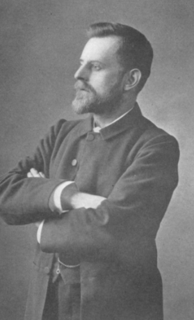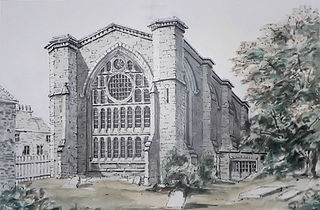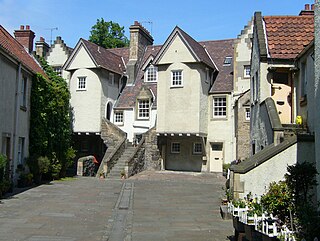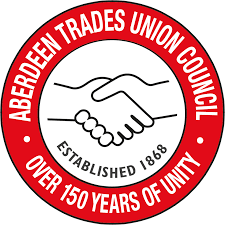
Seven Incorporated Trades of Aberdeen is an ancient society of craftsmen in Aberdeen, Scotland. Their home is Trinity Hall on the city's Holburn Street. [1]

Seven Incorporated Trades of Aberdeen is an ancient society of craftsmen in Aberdeen, Scotland. Their home is Trinity Hall on the city's Holburn Street. [1]

The society comprises seven trades:
The first Deacon Convenor of the joint seven trades was George Elphinstone, a saddler in the Guild of Hammermen, appointed in June 1587. In an effort to alleviate disputes between the various trades this body was created and created what was known as the Aberdeen Magna Carta, a charter drawn up to agree processes and settlement of disputes ratified in August 1587 and raised to the status of a Royal Charter by King James VI on 16 July 1617. [2]

George Adam Smith was a Scottish theologian.

Odd Fellows is an international fraternity consisting of lodges first documented in 1730 in London. The first known lodge was called Loyal Aristarcus Lodge No. 9, suggesting there were earlier ones in the 18th century. Notwithstanding, convivial meetings were held "in much revelry and, often as not, the calling of the Watch to restore order." Names of several British pubs today suggest past Odd Fellows affiliations. In the mid-18th century, following the Jacobite risings, the fraternity split into the rivaling Order of Patriotic Oddfellows in southern England, favouring William III of England, and the Ancient Order of Oddfellows in northern England and Scotland, favouring the House of Stuart.

Marischal College is a large granite building on Broad Street in the centre of Aberdeen in north-east Scotland, and since 2011 has acted as the headquarters of Aberdeen City Council. However, the building was constructed for and is on long-term lease from the University of Aberdeen, which still uses parts of the building to house a museum. Today, it provides corporate office space and public access to council services, adjacent to the Town House, the city's historic seat of local government. Many Aberdonians consider Marischal College to be an icon of the "Granite City" and to symbolise the zenith of Aberdeen's granite-working industry.

St Machar's Cathedral, is a Church of Scotland church in Aberdeen, Scotland. It is located to the north of the city centre, in the former burgh of Old Aberdeen. Technically, St Machar's is no longer a cathedral but rather a high kirk, as it has not been the seat of a bishop since 1690.
A labour council, trades council or industrial council is an association of labour unions or union branches in a given area. Most commonly, they represent unions in a given geographical area, whether at the district, city, region, or provincial or state level. They may also be based on a particular industry rather than geographical area, as for example, in the Maritime Council of Australia which co-ordinated the waterfront and maritime unions involved in the 1890 Australian Maritime Dispute.

The Kirk of St Nicholas is a historic church located in the city centre of Aberdeen, Scotland. Up until the dissolution of the congregation on 31 December 2020, it was known as the "Kirk of St Nicholas Uniting". It is also known as "The Mither Kirk" of the city. As of 1 January 2021, the building falls under the care and maintenance of the General Trustees of the Church of Scotland.
Alan Main is a retired minister of the Church of Scotland.
The Royal Company of Merchants of the City of Edinburgh, also known as the Merchant Company of Edinburgh or just the Merchant Company, is a company or society with a Royal Charter from 1681, but dating back to at least 1260. The Company or Confraternity was created to protect trading rights of the merchants of the royal burgh of Edinburgh. It also carries out a significant amount of charitable and educational work. Along with the Incorporated Trades it is one of the Guilds of the City of Edinburgh. The company historically formed part of the now defunct Corporation of the City of Edinburgh.

William Guild (1586–1657) was a Scottish minister, academic and theological writer.

St Katharine's by the Tower was a medieval church and hospital next to the Tower of London. The establishment was founded in 1147 and the buildings demolished in 1825 to build St Katharine Docks, which takes its name from it. It was re-established elsewhere in London and 123 years later returned once more to the East End. The church was a Royal Peculiar and the precinct around it was an extra-parochial area, eventually becoming a civil parish, which was dissolved in 1895. The Royal Peculiar survives to the present day as the Royal Foundation of St Katharine.

Bishop Dunbar's Hospital was founded in 1531 by Bishop Gavin Dunbar, the Elder. The hospital was endowed by a mortification just before his death. Dunbar petitioned the King, James V of Scotland, and the charter, signed on 24 February 1531 records the King’s approval that ‘[Dunbar shall] ... found an hospital near the cathedral church, but outside the cemetery...’ It was also known as St Mary's Hospital. In the mortification, Dunbar's charitable purpose is recorded. Bedesmen were supported by a charitable foundation that emerged from the original church control until the twenty-first century. Bedesmen drew their name from the word "bede" - a prayer. The residents of Dunbar's Hospital said prayers in a cycle of Divine Office. The Bede House, Old Aberdeen was used by the Bedesmen from the hospital from 1789 to the end of the nineteenth century. The only remains of the 1531 building can be seen in a perimeter wall for Seaton Park in Old Aberdeen. The last Bedesman died in 1988. The Managers of the Hospital constituted a Charity, Bishop Dunbar Hospital Trust. The Charity ceased active operation in 2012.
Several Aberdeen trades hospitals were built by the merchants and trades associations of Aberdeen from the sixteenth to the nineteenth century. Traditionally hospitals had been built by the church.
Like most cities and towns across Scotland, Aberdeen and its twin city of Old Aberdeen had Poorhouses to complement the provision for the poor and need provided by the Church, the merchants and the Trades. A Poor Hospital was founded in 1741. This replaced the "Correction House" dating from the 1636/7

William Dick was a Scottish veterinarian and founder of the Dick Vet School in Edinburgh, the first veterinary college in Scotland. He is responsible for major advances in the field of veterinary science and the profession as a whole.
James Sherriffs or Shirreffs (1752–1830) was a Scottish minister who served as Moderator of the General Assembly of the Church of Scotland in 1807.

Aberdeen Trades Union Council (ATUC) is the body made up of affiliated trade union branches and organisations working in the Aberdeen and Aberdeenshire area to promote the interests of workers in the region. The ATUC provides services to affiliated branches on a wide range of industrial, social and community issues and is affiliated to the STUC. It has an office based in Aberdeen, Scotland.

The Magdalen Chapel is a 16th century chapel on Cowgate in the Old Town of Edinburgh, Scotland. It is designated as a Category A listed building.
Jean Guild became Jean Anderson was a Scottish philanthropist in Aberdeenshire. She created an Aberdeen charitable trust that cared for orphans.